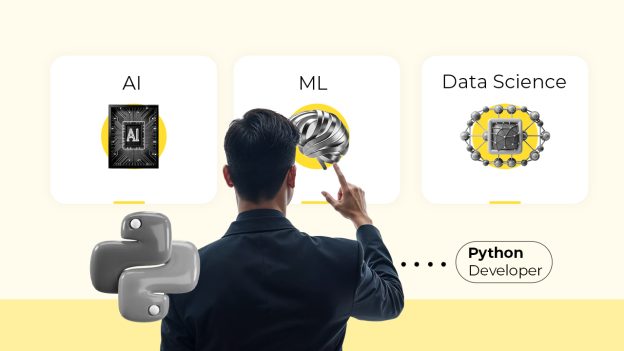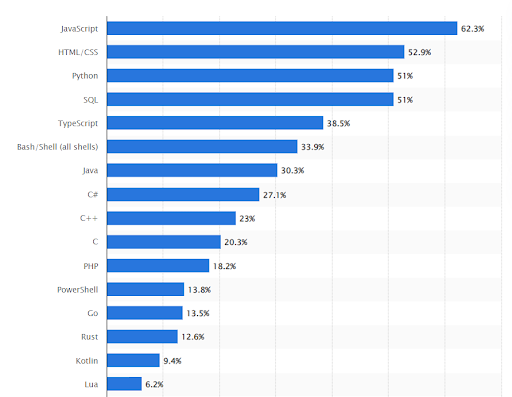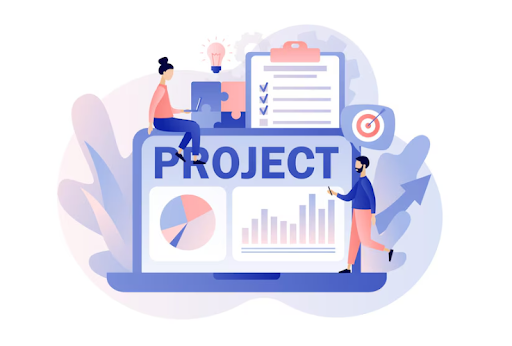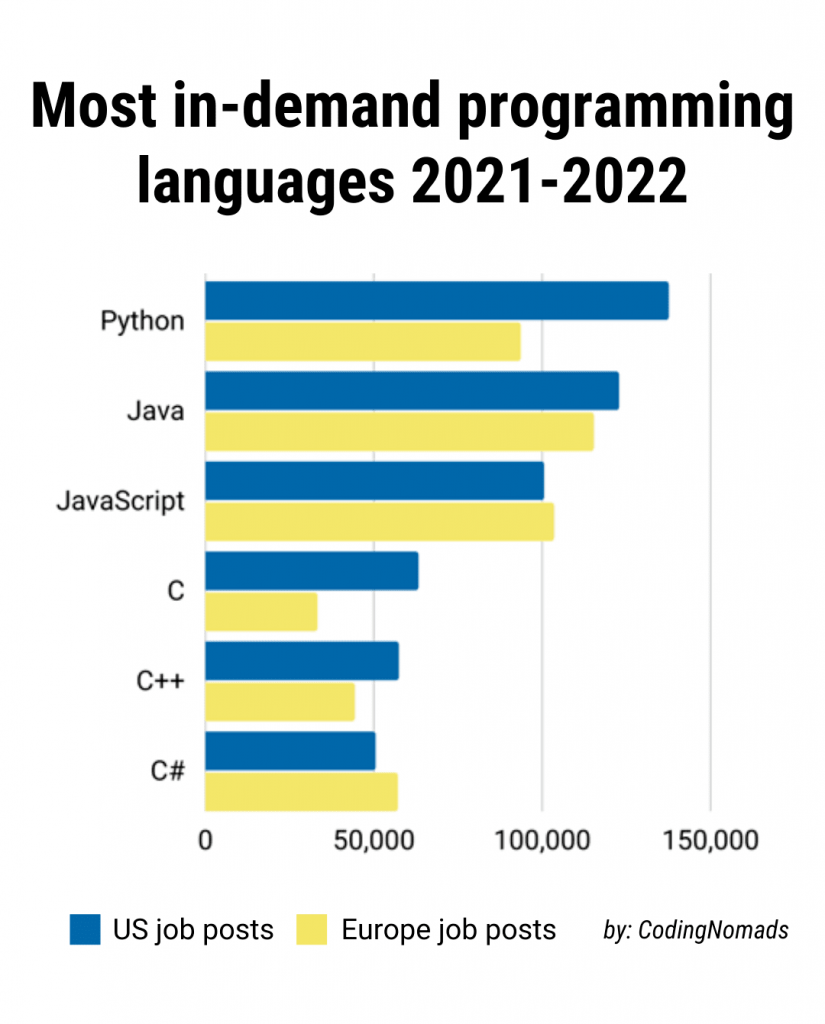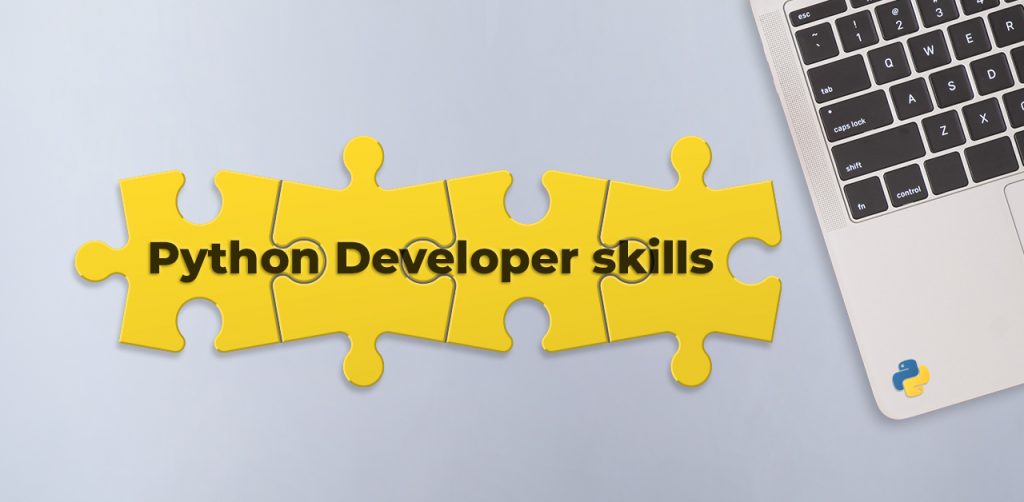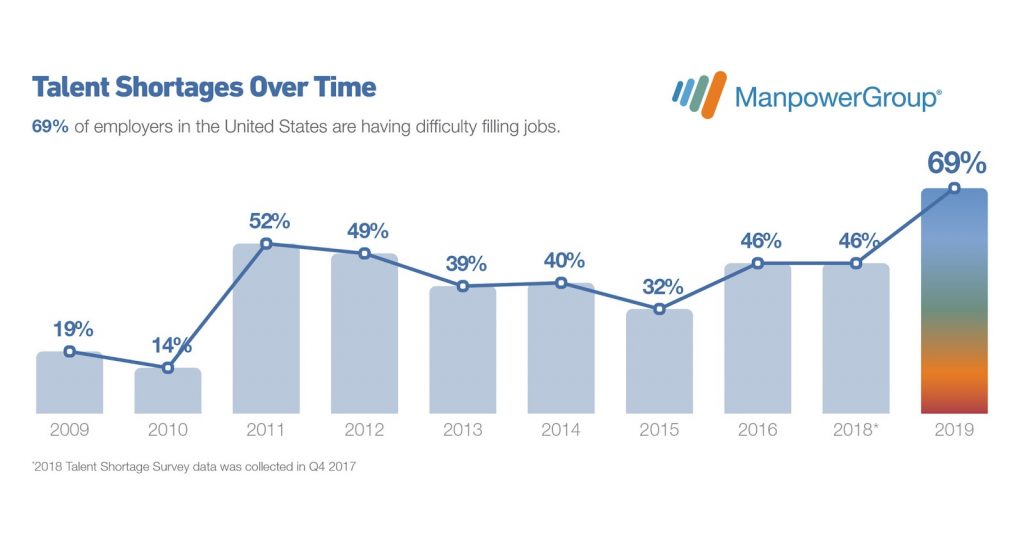Python is paramount for AI, ML, and Data Science, and is renowned for its flexibility and enormous library ecosystems designed specifically for these technologies. It has robust AI/ML frameworks, mature data science libraries, simple scalability, and strong community support.
Python remains one of the top-ranked languages in AI and Data Science. The demand for Python professionals has grown and skilled Python developers are needed more than ever.
However, skill shortages, extreme competition, price instability, specialist skills, and scalability problems are top recruitment hurdles. Let’s understand when to hire Python developers, what is the approximate cost to hire a Python developer, and what key Python developer skills to consider.
Function of Python Developer in AI, ML, and Data Science
Python developer roles and responsibilities in AI, ML, and Data Science constitute:
- Development of AI/ML models
- Preprocessing of data and cleaning datasets.
- Deploying AI frameworks & deep learning architectures.
- Optimizing AI models in cloud-based infrastructures.
The role of a Python Software Developer is different from that of a Python AI/ML Engineer.
- A Python Software Developer devotes most of their time to web development, backend systems, scripting, and deployment of applications for smooth software operation.
- Python AI/ML Engineers devotes most of their time to machine learning, AI model development, data science, and predictive analysis on deep learning platforms and cloud AI solutions.
Core Python Developer Skills in AI, ML, and data-driven projects are:
- Understanding of the Python framework and ML & deep learning models
- Application of technical skills in data processing, big data, cloud computing, DevOps, and MLOps.
Technical Skills to Look for in a Python Developer

When hiring backend developer like Python developer for AI, ML, and Data Science, assess these mus-have following skills:
A. Programming and Frameworks
An efficient Python developer must understand:
- Python Basics with skills in OOP, data structures, algorithms, and Python libraries skills to code efficiently.
- AI/ML Frameworks and Libraries like TensorFlow, PyTorch, Scikit-learn, and Keras to create ML models.
- Data Science Libraries like Pandas, NumPy, Matplotlib, Seaborn, and SciPy for data manipulation, visualization, and statistical analysis.
- Big Data Tools like Apache Spark, Dask, Hadoop, and Kafka for processing mass-level data.
B. Machine Learning and AI Domain Knowledge
An ideal Python AI/ML programmer should have experience in:
- Supervised and unsupervised learning techniques and deep learning models, including CNNs, RNNs, Transformers, etc.
- Training, fine-tuning, and deploying ML models efficiently utilizing GPU acceleration and hyperparameter optimization.
- Libraries like Google AutoML, H2O.ai, and MLflow for auto-selecting the model and optimizing.
C. Data Science and Analytical Competencies
A Python developer should have proficiency in:
- Missing data treatment, feature extraction, and data visualization for model performance improvement.
- SQL for querying structured data and NoSQL for processing unstructured data.
- Deploying AI models using AWS like SageMaker, Lambda, EC2, Google Cloud AI, and Azure Machine Learning.
D. Software Development Best Practices
A Python programmer should be following best practices in:
- Version Control using Git, GitHub, and GitLab for collaborative development and code management.
- CI/CD for ML Models using continuous integration to automate AI pipelines.
- DevOps & MLOps Practices like containerization and AI model monitoring to track and maintain ML performance.
Soft Skills That Matter in a Python Developer for AI, ML, and Data Science
Here are critical soft skills to look out for:
Problem-Solving Mindset & Analytical Thinking – An expert developer must:
- Recognize data processing, model training, and deployment issues instantly.
- Employ logical reasoning to improve model performance.
- Analyze operational hurdles to enhance scalability
Strong Communication & Teamwork – AI development involves collaboration with different IT teams. A top Python developer must:
- Explain AI concepts in a way that non-technical teams can also understand.
- Collaborate smoothly with cross-functional teams.
- Write code and processes for future optimization.
Adaptability to New Technologies & Trends – The AI/ML world continues to evolve, and the skilled developer must:
- Stay abreast of existing AI advancements.
- Acclimatize to new libraries, frameworks, and coding standards.
- Excel at cloud computing, AI model optimization, and automated methods.
Where to Find Qualified Python Developers

For hiring a Python developer in 2025, consider:
- Best Job Platforms for Employing Python Developers – Example LinkedIn, GitHub, and Upwork & Toptal for flexible freelance AI/ML Python programmers.
- AI and Data Science Communities, AI Conferences & Hackathons, and other AI Groups.
- Hire Python developers at top Universities, boot camps & online courses.
How to Assess a Python Developer’s Competency
Hiring a Python developer for AI/ML requires a systematic assessment process:
- Resume Screening – Consider relevant experience, technical proficiency, project portfolio, and certifications.
- Technical Interview – Look out for responses related to Python & ML expertise, coding exercises, and big data & deployment expertise
- Review of Project Portfolio – Check and verify real-world experience, evaluation of AI Models, and other project experiences.
- Live Coding and Take-Home Assignments – Test efficiency in real-time debugging, documentation, and code quality.
Hiring a Python Developer in 2025 – Freelancer vs Full-Time vs Outsourcing
Hiring Model | Best For | Where to Hire | Pros | Cons | Pro Tip |
| Freelancers | Short-term AI/ML projects, quick prototypes, consulting | Upwork, Toptal, Fiverr, | Cost-effective, quick hiring, flexible work models, least investment required | Limited availability, security risks, time zones, and language barriers. | Use for instant, small projects, AI proof-of-concepts, or fine-tuning tasks. |
Full-Time Developer | Ongoing AI/ML projects needing dedicated talent | LinkedIn, Glassdoor, AngelList, | Long-term stability, strong collaboration, full project ownership | Higher costs, longer hiring process | Invest in upskilling to retain AI talent. |
| Outsourcing to Agencies | Large-scale AI projects needing full-stack AI teams | Turing, Uplers, Toptal, | Access to experienced teams, faster delivery, reduced risk | Higher costs, less control over project execution | Keep AI model ownership in-house. |
Salary Expectations & Budgeting for 2025
AI/ML salaries vary based on region, experience, and project complexity:
Region | Average ($) |
USA | 90,000 – 200,000 |
UK | 70,000 – 160,000 |
| India | 15,000 – 80,000 |
| Europe | 80,000 – 170,000 |
Factors to Consider Before Hiring a Python Developer in 2025
Check:
- Project Complexity – Difficult and large AI projects raise costs.
- Location – Offshore recruitment in countries like India and Eastern Europe is cheaper than US/EU.
- Experience Level – Senior AI engineers require 2-3 times more pay than junior developers.
Negotiation & Competitive Compensation Best Practices
- Recruit the best talent with performance-based rewards.
- Offer flexible work arrangements, as preferred by many AI developers.
- Provide upskilling opportunities to enhance retention.
Common Hiring Mistakes
Avoid these mistakes when hiring a Python developer in 2025:
Prioritizing Only Python
Python knowledge is not sufficient. You must look for practical AI/ML experience with libraries such as TensorFlow, PyTorch, and Scikit-learn. Check for data handling, model tuning, and AI integration capabilities in real-world projects.
Neglecting Real-World Project Experience
Certifications and theoretical knowledge cannot substitute practical experience in AI/ML. Give preference to candidates with experience in GitHub projects, participation in Kaggle, and real-world AI case studies.
Neglecting Soft Skills & Team Collaboration
AI developers need to communicate well and work across teams. Evaluate their expertise in explaining AI concepts to non-technical teams, and their ability to change with new AI trends and challenges.
Future Trends in Hiring Python Developers for AI and ML in 2025
As AI continues to advance, so must hiring procedures- AI is revolutionizing recruitment through automated resume screening, AI-based aptitude tests, and predictive employee selection analytics
No-Code & Low-Code AI Platforms – AI development is increasingly becoming mainstream, enabling non-programmers to develop ML models. Python programmers need to specialize in sophisticated AI methods and model optimization to remain competitive.
Continuous Learning & Upskilling – With AI rapidly changing, developers are required to adapt and upgrade their skills continuously. Organizations must offer access to research & open-source contributions to keep the team abreast of current AI trends.
Conclusion
AI and ML are revolutionizing sectors, and hiring qualified Python developers has become a priority. Begin by determining if you require a Python software developer, AI/ML engineer, or data scientist.Utilize strategic recruitment platforms and systematic assessment procedures to filter applications effectively.
Hire Python developers who are committed to continuous learning since AI technologies develop at a rapid pace. The demand is huge while supply is limited. Consult professionals and draw significant parameters to hire Python developers.
Frequently Answer Questions
How to gauge Python developer skills before hiring them?
Ans: Perform live coding interviews, testing candidates on data preprocessing, model training, and optimization. You can ask them to examine an open-source AI project to gauge their practical experience.
Should I hire Python developers in-house or outsource the project?
Ans: If you require long-term AI development and complete business integration, hire in-house. If you require niche AI solutions without a full-time team, you can outsource. You can also hire freelancers for an AI prototype kind of project.
How long does it take to hire a Python AI/ML developer?
Ans: It takes about 4-6 weeks to recruit a full-time developer because of screening and interviews. Freelancers can be integrated in 1-2 weeks. Elite AI development agencies offer pre-screened teams for instant deployment.
How significant is cloud experience for Python AI/ML developers?
Ans: Cloud know-how is the key to the scalability and deployment of AI. Developers must know how to work on big-sized AI projects using tools like AWS SageMaker, Google Vertex AI, or Azure ML skills, together with MLOps, containerization, and serverless computing skills.
What are the biggest hiring challenges for AI/ML in 2025?
Ans: Some of the key challenges in hiring a Python developer in 2025 are heavy competition, skill shortage, high salary demands, and retention. Firms need to offer competitive wages and attractive AI projects to hire Python developers.
